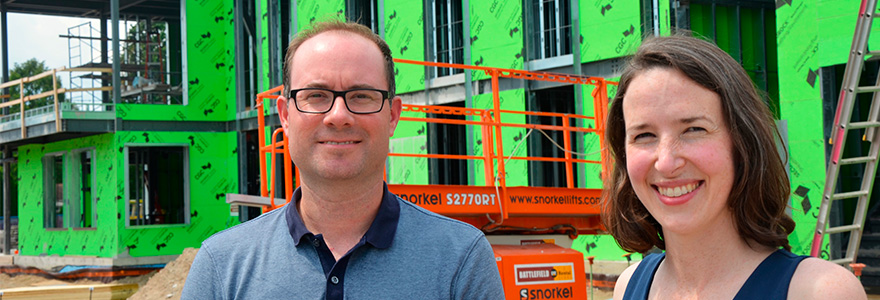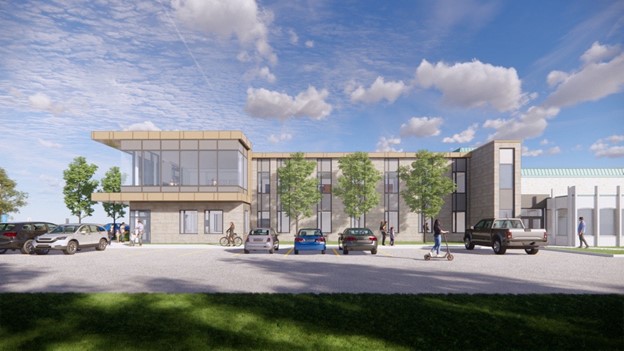
MJW-CYDC Director Dr. Colin King and Assistant Director Dr. Katelyn Bryant stand in front of the soon-to-be new home for this important community clinic.

MJW-CYDC Director Dr. Colin King and Assistant Director Dr. Katelyn Bryant stand in front of the soon-to-be new home for this important community clinic.
After opening its doors in 2017, it took only four months for our Mary J. Wright Child & Youth Development Clinic (MJW-CYDC) to help about 100 families and receive close to 250 requests for their mental health care services.
The demand isn’t letting up.
In the wake of the COVID-19 pandemic, MJW-CYDC Director Dr. Colin King says there has been a notable rise in mental health demands and learning gaps among children and youth in the London, Ont., area.
Elsewhere, Children’s Mental Health Ontario estimates that 1.6 million children and youth in Canada have a mental health disorder. Thousands are waiting up to two and a half years for treatment.
With upwards of 100 children on their own waitlist, the need far exceeds what the MJW-CYDC can accommodate, and that’s exactly why King is so excited for an upcoming expansion.
“Over the last six and a half years, we’ve been really trying to demonstrate the impact of a model,” King said.
“Now we have results to show that.”
The model behind the MJW-CYDC is a clinic that could provide a full continuum of mental health care and services for those who need it most in our community, all while serving as a world-class training site for the next generation of mental health professionals.
Its services range from early intervention to more intensive and individualized support for children and families. Families can self-refer, breaking down the barrier that often comes with relying on a physician referral.
These services are not covered by the Ontario Health Insurance Plan (OHIP), so costs are instead placed on a sliding scale that’s tied to a parent or caretaker’s income. Thanks to the generosity of donors via an accessibility fund, roughly half of all families who come to the MJW-CYDC benefit from further discounted services.
Helping deliver these services are graduate students in Western’s School and Applied Child Psychology Program, who work under the close supervision of school and clinical child psychologists.
The MJW-CYDC extends its reach even further through partnerships with a multitude of community organizations including the London District Catholic School Board, the Learning Disabilities Association of London Region, Muslim Resource Centre for Social Support & Integration, TVCC (formerly Thames Valley Children’s Centre), London Health Sciences Centre and Vanier Children’s Services.
The results speak volumes.
To date, the MJW-CYDC has supported more than 1,300 families through a range of psychological services, including psychological assessments, individual and group counselling, psychological consultations, and workshops for caregivers and caring adults on supporting mental health needs for children and youth.
More than 90 graduate students have trained at the clinic through practicum experiences or internships. Many of these students go on to pursue key leadership and clinical roles within mental health agencies, school boards, hospitals, clinics and private practices.
We are excited to share that in early 2025, the MJW-CYDC will move to a 10,000 sq. ft. addition to the Faculty of Education at 1137 Western Rd. The Clinic’s new home will be three times the size of its current location at 1163 Richmond St.
The move is desperately needed.
“We have run into constraints with respect to our child programming, our group programs and workshops,” King said.
“The new clinic really provides a whole range of possibilities.”
With the extra space, the Clinic has a long-term goal of recruiting two additional clinical supervisors, who would oversee six additional graduate trainees. The extra help means the MJW-CYDC can expand its services to schools and community sites across the region, helping tackle the growing waitlists throughout Ontario.
It will also translate to support for another 100 to 150 children and youth each year.

The new space will foster more opportunities for collaborations as well, which will improve the research and interdisciplinary training already happening with colleagues from all over Western.
One recent example includes the Clinic’s hosting of Teacher Candidates in Western’s Bachelor of Education program through a partnership that trained future teachers on how to identify and remediate student literacy needs.
The timing couldn’t be better, as the Clinic is now receiving national recognition as a leading training site for future mental health professionals.
Since 2018, the MJW-CYDC has acted as an internship site for psychology residents — students in the final year of their clinical psychology PhD program. These internships are carried out alongside the Navigating Onward Clinic and London Family Court Clinic through what’s called the Narwhal Psychology Consortium (NPC).
In late 2023, the NPC was accredited as an internship program by the Canadian Psychological Association (CPA) for a six-year term. The standards for accreditation and applicants must undergo a rigorous process. The NPC is one of only two such programs in southwestern Ontario to receive the CPA’s prestigious endorsement.
Graduating from an accredited program comes with many benefits to future psychologists, meaning this will translate to attracting better talent and providing better care for children and youth.
“We’re welcoming our first accredited psychology resident in September. I’m really excited,” King added.
When he thinks about what the MJW-CYDC’s small, but mighty team has accomplished so far, King has no shortage of pride.
“The new building is such a representation of the hard work that everyone’s put in to get to this point,” he added.
In the meantime, the hard work continues at the MJW-CYDC, and for King, that means he has plenty of reminders on the horizon of what keeps him motivated.
“I know how difficult it can be for a child, a parent or a family to be in distress and not know where to turn. To be able to provide a sense of hope, understanding and possibility of change is honestly so profound on my end,” King added.
“Those are the small and big moments you really live for in this line of work.”
It’s an accurate description for the case of an eight-year-old child who was struggling with learning challenges and anxiety.
Their parent, who wishes to remain anonymous for the child’s privacy, says the Clinic has been a “total game-changer for our family.”
“We were at a complete loss for how to help our daughter, and get the understanding and support we needed to move forward,” the parent said.
“We’re so thankful to have the MJW-CYDC as a leader in this field.”
As exciting as the expansion is, the reality is that the MJW-CYDC will need $5 million to reach its goal of helping even more families now and into the future.
Your support will help the MJW-CYDC continue to drive new knowledge that not only enhances the care it provides, but also improves mental health services across Ontario and beyond. Growing the Clinic’s research output will position it to become a Canadian leader in developing evidence-based practices and supports for children with learning and mental health challenges.
Donations will also support growing the MJW-CYDC’s team, simultaneously boosting the number of children the Clinic serves, as well as the future mental health professionals it trains.
There is no better time to invest in youth mental health care.
We invite you to lay the foundation for healthier children and a healthier society.
To lend your support to the MJW-CYDC, please click here.